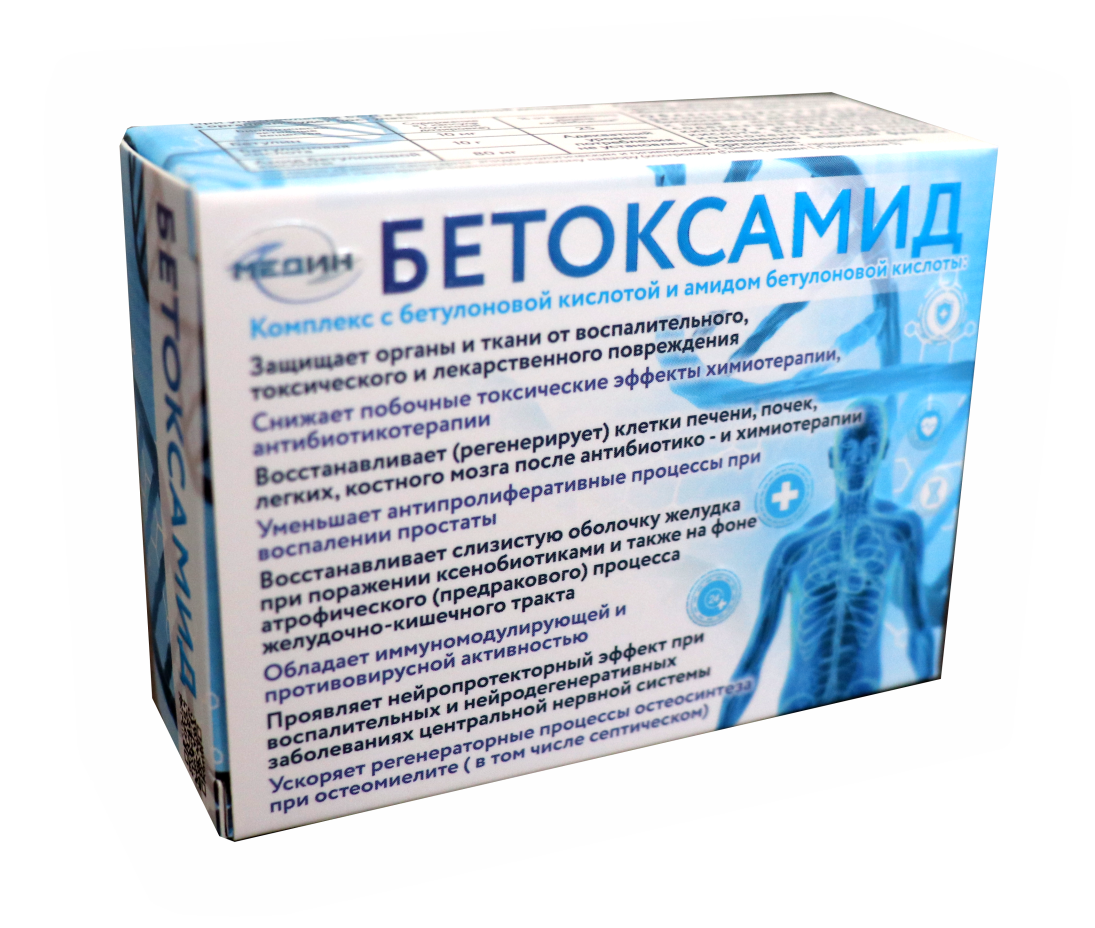BETOKSAMID

Properties of amid betulonic acid in the "BETOKSAMID"composition
Currently, as a result of long-term research on the pharmacological activity of amid betulonic acid and its derivatives, following effects are proven:
Antioxidant, hepatoprotective, gastro-nephroprotective, both against the background of cytostatic mono- and polychemotherapy, and against the background of toxic (chemical, ethanolic, medicinal) and inflammatory damages to organs and tissues
Immunomodulatory and antiviral activity
Increase of the gastric mucosa resistance when affected by xenobiotics
The mechanism of cytoprotective action of betulonic acid in organs not affected by malignant growth is provided by reducing inflammatory and necrobiotic changes in tissues, reducing the severity of dystrophic lesions in cells and stimulating regenerative and plastic processes in them, correcting the immuno- and hematotoxic effects of chemotherapeutic agents.
Betulonic acid activates the synthesis of cytochrome P-450 (the main enzyme protecting the body from xenobiotics), thus implementing an antioxidant and membrane stabilizing effect.
Bone marrow cells protection from damage during cytostatic polychemotherapy
Prostate inflammation reduction
Betulonic acid acts synergistically with cytostatics on tumor cells, enhancing their effect by inducing the internal mitochondrial pathway of apoptosis, which is not characteristic of traditional drugs. It also reduces the severity of dystrophic and necrobiotic changes caused by polychemotherapy, improves the function of the microcirculatory bed in the internal organs, increases cellular plastic reserves. Stimulates the T-cell immune system activity, which increases the antitumor body resistance.
Liver, kidney, lung and bone marrow cells restoration (regeneration) after antibiotic- and chemotherapy
It is not toxic (the average mice lethal dose of betulonic acid (LD50) is 5000 mg/kg when administered intragastrically).

Where to buy BETOKSAMID?

History
Betulonic acid as a product of betulin transformation was first mentioned in the works of D.L. Simonsen (English organic chemist) in 1957. In 1969 publications about betulonic acid as a product of transformation of lupane triterpenoids appeared again. Only in 1996 the Laboratory of Medical Chemistry (headed by Prof. E.E. Schultz) of the N.N. Vorozhtsov Novosibirsk Institute of Organic Chemistry SB RAS was the first in Russia, as well as in the world, to isolate betulonic acid as an individual substance and to fully characterize its physicochemical properties. At the end of the 20th century there was a great interest of researchers in betulonic acid as a promising molecule for the creation of new biologically active compounds.
In Russia the first results on the pharmacological evaluation of betulonic acid and its derivatives in vivo were obtained in 2001 in the Laboratory of pharmacological researches (Prof. T.G. Tolstikova) of the N.N. Vorozhtsov Novosibirsk Institute of Organic Chemistry SB RAS, where these studies are still being successfully carried out.
Media about as
Наш Новосибирск от 01.05.2021_Новосибирские учёные рассказали о средстве для восстановления клеток организма после химиотерапии
Обычная берёза поможет снизить последствия химиотерапии_new
Новосибирские учёные рассказали о средстве для восстановления клеток организма после химиотерапии
Scientific facts
BETOKSAMID
Biologically active food supplement "Betoksamid" contains birch bark triterpenoid - betulonic acid and amid of betulonic acid which contributes to the regulation of intracellular processes, activation of microsomal cell system, protect organs and tissues from toxic, drug, inflammatory damage, as well as the restoration of liver cells, kidneys, lungs, bone marrow after antibiotic therapy, chemotherapy. It also shows immunomodulatory and antiviral activity.
"Betoxovit" contains two active components of birch bark - betulin (20 mg) and betulonic acid (80 mg). The birch (Betula pendula Roth.) of the birch (Betulaceae) family is one of the major forest-forming species of Russia.
Folk medicine for centuries has been using birch leaves, buds, bark, birch catkins and even birch pollen as a diuretic, anti-inflammatory, choleretic, vitamin, antiseptic, to treat various kinds of inflammations and tumors, including malignant. Birch brooms are not just a tribute to tradition - biologically active compounds contained in the birch leaves penetrate through the expanded pores of steamed skin and help get rid of colds and inflammatory processes.
What does a birch tree contain?
In 1788 I.T. Lovitz, a Russian chemist and academician of the St. Petersburg Academy of Sciences, isolated from birch bark a compound, which the Frenchman Maison called betulin (from the Latin betula - birch) in 1831.
In spite of the fact that the birch bark B. pendula birch contains various groups of biologically active substances: saponins, tannins, essential oils, hydrocarbons, flavonoids, coumarins, carotenoids, terpenoids, the main components are derivatives of the pentacyclic triterpenoid - lupane.
A large percentage in the composition of birch bark is composed of triterpenoids, in particular betulinol (78.1%) up to 40%, lupeol (7.9%), betulinic acid methyl ester (4.3%), erythrodiol (2.8%), oleanolic acid methyl ester (2.0%), betulinic aldehyde (1.2%), other triterpene compounds account for approximately 3.7% , including betulinic acid. The presence of such amino acids as methionine, threonine, phenylalanine, tryptophan, lysine, ornithine, alanine, serine, proline, glutamic acid, asparagic acid, glutamine was found.
What are the useful properties of the BETOKSAMID main components?
Betulin has been thoroughly studied by physicians, biologists, pharmacists in almost 40 countries since the 19th century. It is recommended by the Ministry of Health and Social Development of the Russian Federation as a dietary supplement with a wide range of biological activities: gastroprotective, anti-ulcer, antiseptic, antiviral (herpes virus and Epstein-Barr virus, is an anti-HIV agent), anti-inflammatory, hepatoprotective, antioxidant. Betulin exhibits no toxic properties, has no allergic, carcinogenic, skin irritating, cumulative, mutagenic, sensitizing and embryotoxic effect.
Amid of betulonic acid and betulonic acid have following effects: antioxidant, hepatoprotective, gastro-, nephroprotective, both against the background of cytostatic mono- and polychemotherapy, and against the background of toxic (chemical, ethanolic, medicinal) and inflammatory damages to organs and tissues. It acts synergistically with cytostatics on tumor cells, enhancing their effect by inducing the internal mitochondrial pathway of apoptosis, which is not characteristic of traditional drugs. It also reduces the severity of dystrophic and necrobiotic changes caused by polychemotherapy, improves the function of the microcirculatory bed in the internal organs, increases cellular plastic reserves. Stimulates the T-cell immune system activity, which increases the antitumor body resistance.
The "BETOKSOVIT" was created based on the results obtained during long-term study by scientists of the Laboratory of pharmacological researches (SGR № AM.01.07.01.003.R.000180.07.20 dated 28.07.2020. TU 10.89.19-115 - 03533903-2020. Biologically active food supplement "Betoksovit”. Not a medication. Shelf life - 2 years). It contains betulonic acid and is proposed as a dietary supplement that helps regulate intracellular processes; activate the microsomal cell system; protect organs and tissues from toxic, drug and inflammatory damage; restore liver, kidneys, lungs, bone marrow cells after antibiotic therapy, chemotherapy, and also exhibit immunomodulatory and antiviral activity.
Call: 8 800 555-09-58
E-mail: betoksovit@internet.ru
Organization authorized to accept claims from consumers:
N.N. Vorozhtsov Novosibirsk Institute of Organic Chemistry of the Siberian Branch of the Russian Academy of Sciences
(NIOH SB RAS) 630090, Novosibirsk region, Novosibirsk, Akademika Lavrentieva Avenue, 9,
Russian Federation
Useful links:
